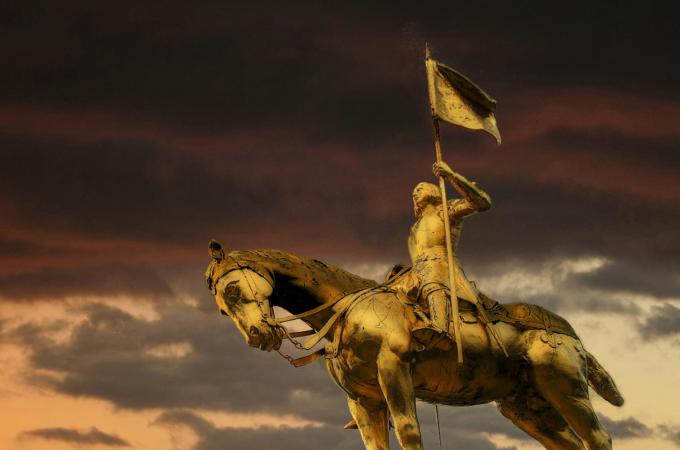Holy warriors
Almost exactly 100 years ago, on May 16, 1920, the Catholic Church canonized St. Joan of Arc. Two days later, Karol Wojtyla was born. The timing is almost poetic. So is the fact that we are observing the centenaries of two great Christian warriors now, when we could all use a booster shot of courage. Of course, courage isn't recklessness or the lack of fear. Both St. Joan and St. John Paul show us that.
Heavenly voices called Joan into a dreary war that had lasted nearly 100 years. It was not the life she expected, but the command was given and she obeyed it. She subjected herself to ridicule and scorn, got herself in front of the king's eldest son, and challenged him to be who he was born to be. Joan did that mostly by being who she was created to be and is known to have said, "I am not afraid, I was born to do this." In other words, knowing who you really are is a source of courage and strength. That's because there is such a thing as the courage of one's convictions. The first conviction a person has is almost always about who -- and whose -- she is.
Of course, the Maid of Orleans didn't stop there. She led men into battle and took all the risks that accompanied that task. But Joan did not go into battle alone. Instead, she carried three different flags -- a penon, a banner, and a standard -- that identified just who she was there to serve. Her small personal pennant bore an image of the Annunciation. Her banner depicted the Crucifixion. The large battle standard was a representation of Christ the Judge, holding the world in his hands between the angel of mercy and the angel of justice. The banner was further adorned with fleurs-de-lis and the names Jhesus and Maria.
Together, the three images told the whole Gospel, from the Incarnation to the Last Judgement, and revealed the path her own life would take. She did not waver because she put her trust in God, and not herself. Joan was on the field because the King of Heaven had put her there. Knowing that gave her the freedom to be bold. Interestingly, Joan of Arc carried the ensigns to avoid killing. At her trial, she stated that she loved her standard 40 times better than her sword and confessed that she had never actually killed an enemy.
Karol Wojtyla was born in a newly independent Poland, but suffered incalculable losses as a child. His mother died when he was eight, just one month before his first Holy Communion. His older brother, Edmund, a doctor, died a few years later from scarlet fever he contracted from a patient. He and his father moved to Krakow in 1938, where he began his higher education. But the university was closed by German military forces after the Nazi invasion in 1939. Two years later, his father died of a heart attack. By 20, Karol was the only surviving member of his immediate family. Those tragic circumstances taught him to trust God -- and the Mother of God -- completely. There was plenty to fear, but also plenty to do.
Wojtyla was employed in various manual labor jobs from 1940 to 1944 to escape deportation, and narrowly avoided capture by hiding in a basement. Though he had refused to fire a weapon during required military training, Wojtyla fought against dehumanizing ideologies in other ways. He championed Polish culture through secret theatrical performances and attended underground seminary classes. In the midst of it all, Wojtyla developed a deep prayer life. He was ordained in 1946.
The battles did not stop after the war ended. Being a Polish patriot and a Catholic priest under Soviet domination and the Polish communist regime wasn't easy. But Karol Wojtyla was true to himself and God kept opening the doors for him. In 1958, Wojtyla became the youngest bishop in Poland. One year later, he dared to offer a public midnight Mass on Christmas in an open field at Nowa Huta, a communist-built town without a church. Crowds came and it became an annual tradition. It is no coincidence that the Soviet Union fell during the pontificate of Pope John Paul II.
There are all kinds of wars and all types of weapons, but the courage to wield them is often in short supply. We don't need to go looking for a fight. The battles for justice, freedom, and human dignity continue around us; they are unlikely to cease on this side of eternity. So, listen to the voices you hear. Know who you are, and to whom you belong. Pick up your standard and sword, your pen and your rosary beads, and answer the call.
Happy 100th feast day, St. Joan of Arc. And happy birthday, St. John Paul II.
- Jaymie Stuart Wolfe is a Catholic convert, wife, and mother of eight. Inspired by the spirituality of St. Francis de Sales, she is an author, speaker, and musician, and serves as a senior editor at Ave Maria Press. Find Jaymie on Facebook or follow her on Twitter @YouFeedThem.



















